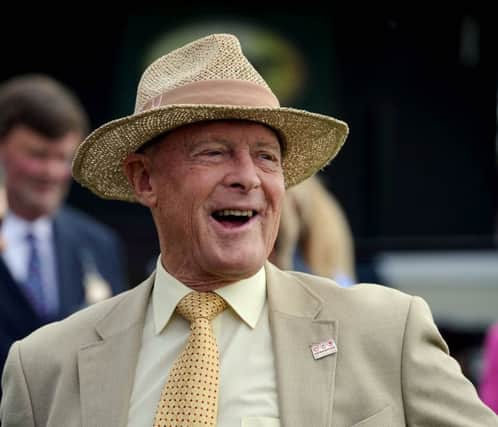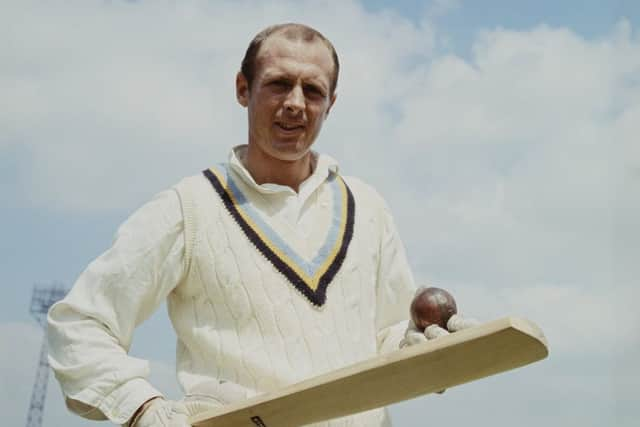Sir Geoffrey Boycott’s mistakes do not invalidate his achievements – David Behrens


But great batsmen like Geoffrey Boycott made me think that I might still somhow aspire to greatness on the field, if only I could remember which side of the wicket to stand.
Boycott was an everyday sportsman. He stood alongside Bobby Charlton, and Denis Compton before them, as ordinary blokes, separated from the rest of us by their extraordinary talent but not by class, privilege or even money. Any one of them could have lived just down the road from me, or so it seemed.
Advertisement
Hide AdAdvertisement
Hide AdHis century of centuries, in that 1977 Test against Australia, in front of his home crowd at Headingley, came during my first summer in Yorkshire, and I won’t easily forget the effect it had – not just on the game but on the country. It was the Queen’s Silver Jubilee year, Virginia Wade had won Wimbledon, and now Boycott’s triumph had helped us take the Ashes. It was a British summer like no other.


Given all that, the knighthood awarded him this week by Theresa May, in her resignation honours list, seemed overdue – especially coming as it did exactly a quarter of a century after Sir Bobby’s.
Yet when the news broke on Tuesday, that was not the consensus. The charity Women’s Aid said it was “very disappointing” that Mrs May had chosen to single him out, and the Women’s Equality Party called for a “Boycott boycott”.
Advertisement
Hide AdAdvertisement
Hide AdThe problem was that Sir Geoffrey had been convicted in France, 21 years ago, of assaulting his then girlfriend, in a Riviera hotel. He has always denied it, maintaining her injuries were accidental.
Nevertheless, the former Spice Girl, Melanie Brown, who is from Leeds and a victim of abuse in the home, called him “a disgrace to Yorkshire”.
No-one doubts that domestic violence is a serious issue. Some 1.3m women and 700,000 men are said to experience it in some form, every year.
And while our achievements do not excuse our mistakes, neither should what we did wrong invalidate that which we got right.
Advertisement
Hide AdAdvertisement
Hide AdSir Geoffrey is the person with whom our county name is probably most synonymous, and that is by dint of his talent – and perhaps his characteristic bluntness – but not his indiscretions. We should embrace that.
The controversy stirred by Mrs May’s list – not just over Sir Geoffrey but also the honours she handed to civil servants whose failed Brexit strategy helped get us where we are today – was in a great tradition of two-fingered farewell gestures. Harold Wilson, most famously, wrote a so-called Lavender List of wealthy businessmen who were close neither to him nor to Labour. Among them were the controversial financier James Goldsmith, a Nigel Farage of his day, and Lord Kagan, the Halifax industrialist whose firm made the distinctive raincoats Wilson always wore. Kagan’s protracted trial for fraud, just four years later, was the single most tedious I ever had to sit through.
John Major’s list, in 1997, was noted more for whom he left out than those he included. His former Chancellor and chief critic, Norman Lamont, was a case in point. And Tony Blair’s list was never issued at all, his resignation overshadowed by a police investigation into cash for honours.
Advertisement
Hide AdAdvertisement
Hide AdSet against such back-stabbing and favour-currying, Sir Geoffrey’s outspoken career seems positively diplomatic. Incidentally, he and his fellow cricketer, Andrew Strauss, were the only people honoured by Mrs May for doing something other than attempting to keep her in office.
In putting his name forward, she will have known that moral outrage would follow – so why did she do it? Other than the obvious explanation that she is out of office and no longer has to clear up the mess, my theory is that she is nostalgic for the lost age of British sport that he exemplified.
She and I are of similar years – we have little else in common – and it is an indulgence to look back wistfully to whence we came, even if we imagined most of it. To a time when sportsmen and women were not rock stars but just people who lived down the road.
I really did once live on the same street as a cricketer for a while – not Sir Geoffrey but Yorkshire’s Matthew Hoggard. There may be a blue plaque on the house now. His, not mine.